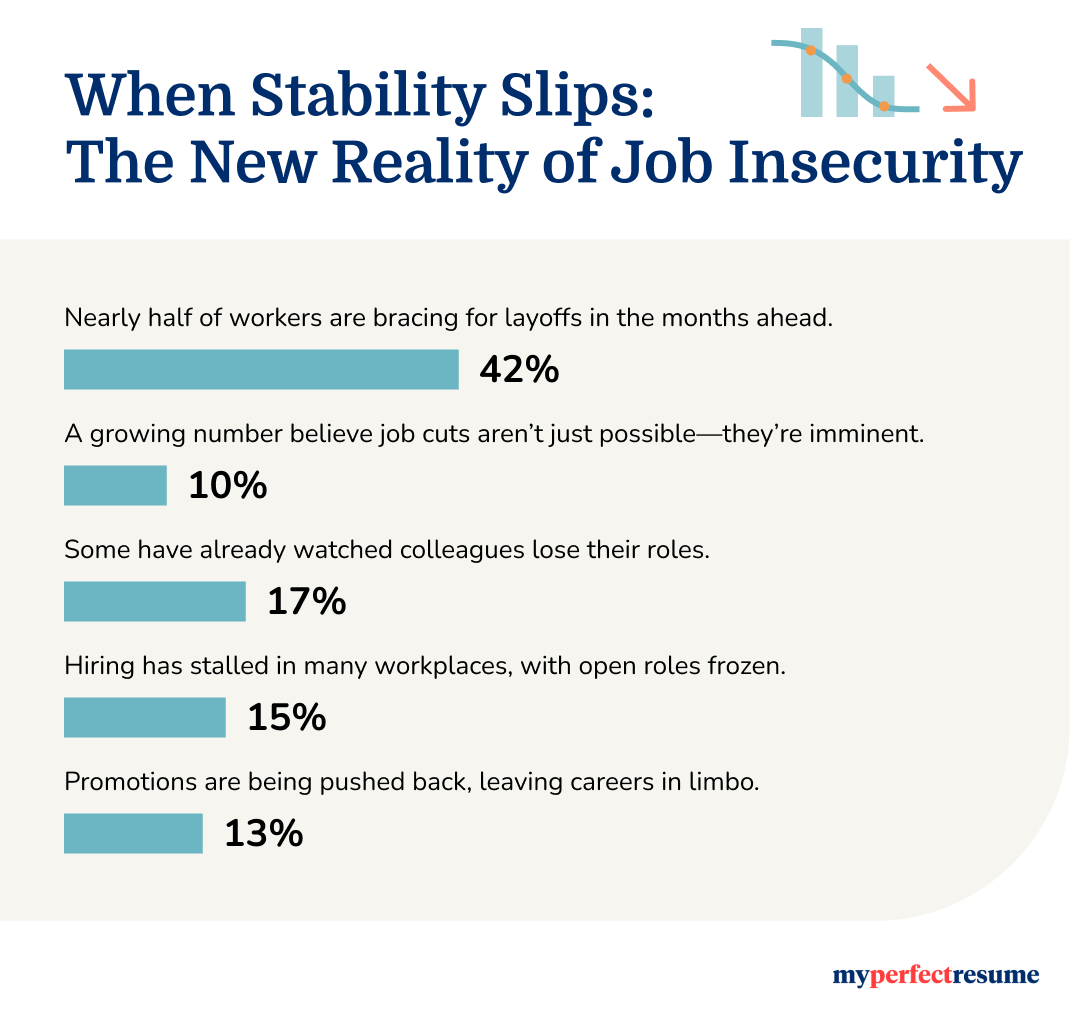Workers on Edge: 80% Fear Wage Loss, 71% Expect Trade Fallout, 42% Anticipate Layoffs

Our customers have been hired at: *Foot Note
Table of Contents
Get started with MyPerfectResume today!
- Build a resume on any device
- Pick an ATS-friendly template
- Tailor with AI copy suggestions
A new national survey from MyPerfectResume reveals that American workers are bracing for economic turbulence. From inflation and stagnant wages to trade tensions and layoffs, employees are increasingly anxious—and making career decisions accordingly.
The 2025 Career Confidence Index surveyed 1,000 U.S. workers and found that most are worried about declining financial stability, growing job insecurity, and the unpredictable effects of global trade policies. Many are taking active steps to protect their careers, including updating resumes, delaying job moves, or learning new skills.
Key findings:
- Inflation is straining workers’ confidence: 80% are concerned that inflation will reduce their real wages or standard of living.
- Tariffs are fueling economic unease: 71% believe that tariffs will negatively impact their job or industry.
- Layoff fears are on the rise: 42% expect layoffs in their company or industry within the next three to six months.
- Job seekers are feeling the squeeze: One in three workers (33%) say it’s now harder to find a job in their field than it was six months ago; only 21% say it’s easier.
- Workers are bracing for disruption: 76% have taken precautionary steps to protect their careers.
- Career plans are on hold: 35% have postponed or reconsidered job or career changes due to economic uncertainty.
- Trust in employers is low: Only 33% trust their employer to be transparent about layoffs or financial challenges.
Financial Stress Is Undermining Confidence
Workers are feeling the squeeze of inflation, and they’re worried it’s only getting worse.
Key stats:
- 80% are concerned that inflation will reduce their real wages or standard of living.
- 38% are very concerned that inflation will reduce their real wages or standard of living.
- 35% say their current salary is already failing to keep up with the cost of living.
- 21% report stagnant wages or salary growth at their company.
What this means: Economic pressure is no longer abstract. It’s impacting day-to-day decisions, budgets, and long-term planning. Employees aren’t just frustrated; they’re financially strained.
Trade Tensions Are Fueling Job Market Anxiety
Global trade disruptions and tariffs are looming large in workers’ minds.
Key stats:
- 71% believe tariffs will negatively affect their job or industry.
- 27% expect major consequences like job cuts or reduced demand.
- 70% say global trade issues could hurt their future job prospects.
What this means: Even if trade policies feel distant, their effects are hitting close to home. Workers across industries are bracing for fallout and looking to protect their roles in a more uncertain market.
Layoff Fears Are Spreading
Job security is becoming a luxury as fears of cutbacks ripple across sectors.
Key stats:
- 42% believe layoffs are likely in their company or industry within the next three to six months.
- 10% say layoffs are “very likely.”
- 17% have already seen layoffs or downsizing at their workplace.
- 15% report hiring freezes.
- 13% say promotions have been delayed.
Here is a visualization of the data from above:
What this means: From hiring slowdowns to stalled advancement opportunities, many workplaces are signaling instability. Workers are picking up on the cues and preparing for the potential job loss.
The Job Hunt Isn’t Looking Promising
For those considering a change, conditions aren’t encouraging.
Key stats:
- 33% say it’s harder to find a job in their field than it was six months ago.
- Only 21% say it’s gotten easier to find a job.
- Nearly half (47%) say there’s been no change at all.
What this means: Momentum has stalled. Instead of an improving market, most workers are seeing stagnation—or a decline in opportunity.
Workers Are Acting Preemptively
In response to growing uncertainty, workers are taking steps to protect their careers.
Key stats:
- 76% have taken some form of precautionary action:
- 18% updated their resume.
- 18% created a financial backup plan.
- 16% pursued new skills or certifications.
- 35% have changed their career plans due to the economy:
- 24% reconsidered switching roles or industries.
- 11% postponed a job change.
What this means: Economic fear is now a driver of career strategy. Instead of chasing new opportunities, workers are focused on safeguarding the ones they have.
Trust in Employers Is Eroding
In uncertain times, communication skills matter, but many employees aren’t feeling informed.
Key stats:
- Only 33% trust their employer to be transparent about layoffs or financial issues.
- 62% say internal communication is limited, delayed, or misleading.
What this means: A lack of clear communication from leadership is compounding anxiety. When employees feel kept in the dark, they’re more likely to assume the worst and plan accordingly.
What Workers Are Worried About Most
Employees aren’t just concerned about the economy in general; they’re thinking about how these challenges, such as increased working hours, will impact their careers.
Top concerns:
- 35% are concerned about their salary not keeping up with inflation.
- 21% are concerned about burnout or poor work-life balance.
- 15% are concerned about job security.
- 14% are concerned about a lack of advancement opportunities.
- 12% are concerned about company instability or poor leadership.
What this means: Job concerns in 2025 go far beyond paychecks. Workers are evaluating everything from leadership trust to career growth, and many are finding their current situations lacking.
The 2025 job market is defined by instability, and employees are responding with caution. Many are shelving major career moves, writing resumes for new opportunities, or diversifying their job skills to stay ahead of whatever comes next.
While the data paints a sobering picture, it also signals resilience. Workers are adapting, watching the signs, and taking steps to protect their futures, such as learning high-income skills to prepare for career moves. In a landscape shaped by inflation, trade turmoil, and economic uncertainty, preparedness may be the strongest asset they have.
For press inquiries, contact Nathan Barber at nathan.barber@bold.com.
Survey Methodology
The findings are based on a national survey of 1,000 U.S. employees, conducted on May 12, 2025, via Pollfish. The sample included a diverse group of full-time, part-time, and contract workers across industries and geographic regions. The survey explored perceptions of job market stability, inflation, trade policy, layoffs, and employer trust.
About MyPerfectResume
MyPerfectResume Resume Builder with professional templates is designed to help job seekers elevate their careers. The easy-to-use platform was created to eliminate the hassle of resume writing, offering professionally written examples, free expert tips, step-by-step guidance to make a resume, and valuable interview advice to create an outstanding job application effortlessly. Since 2012, MyPerfectResume's Resume Builder has helped more than 11 million job seekers create their perfect resumes online. Its comprehensive employment surveys have been featured in Forbes, Yahoo! Finance, CNBC, Newsweek, USA Today, BBC, Workable, and more. Stay connected with MyPerfectResume’s latest Facebook, LinkedIn, Instagram, X, and Pinterest updates.
Our customers have been hired at:*Foot Note










